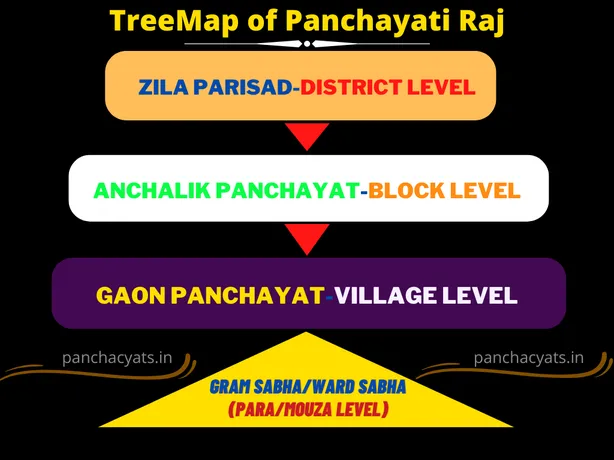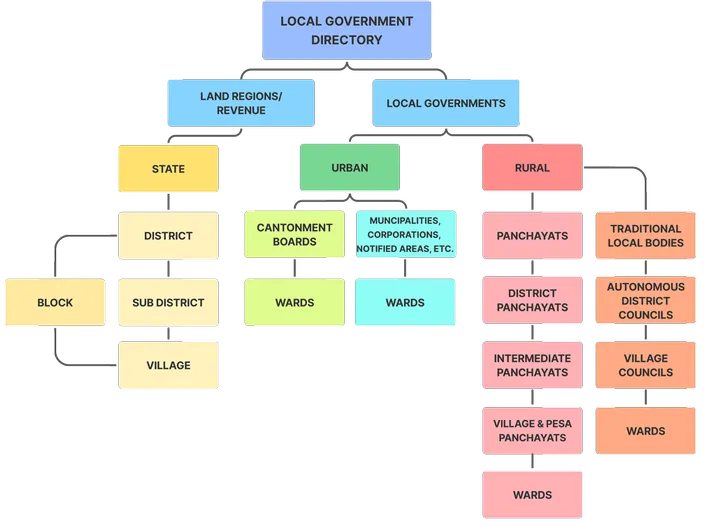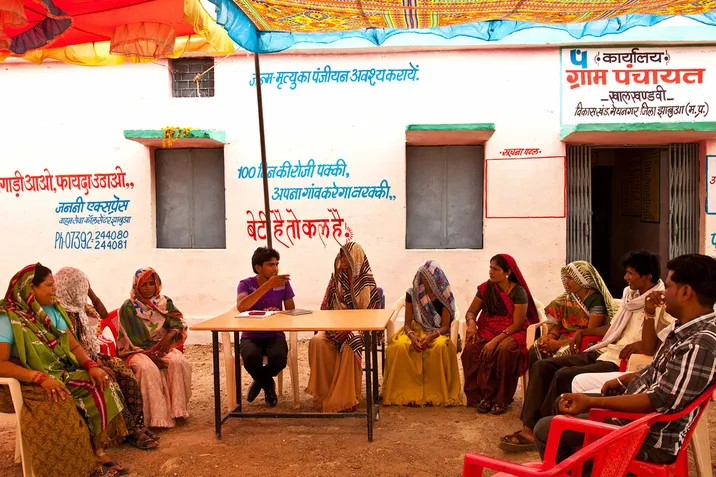The Indian government is divided into two parts the local government and the central government. Panchayat is the part of the local government. Panchayati Raj is the government at the village level that takes care of all needs of the villagers. Let us know more About Nawadih panchayat!
About Nawadih
According to Census 2011 information the location code or village code of Nawadih village is 241536. Nawadih village is located in Belhar subdivision of Banka district in Bihar, India. It is situated 8km away from sub-district headquarter Belhar (tehsildar office) and 38km away from district headquarter Banka. As per 2009 stats, Sahebganj is the gram panchayat of Nawadih village.Geographical area, and Literacy rate of village Nawadih
The total geographical area of village is 68 hectares. Nawadih has a total population of 426 peoples, out of which male population is 222 while female population is 204. Literacy rate of nawadih village is 21.13% out of which 25.23% males and 16.67% females are literate. There are about 66 houses in nawadih village. Pincode of nawadih village locality is 813202.Nearest Town Of Nawadih
Banka is nearest town to nawadih for all major economic activities, which is approximately 38km away.Nawadih
Block / Subdivision → Belhar
District → Banka
State → Bihar
Panchayat Mukhiya
The Panchayati Raj system is a three-tier system of governance in which gram panchayats are the lowest tier of government. The mukhiya is the head of the gram panchayat.He/she is directly elected by the people and is responsible for the overall functioning of the panchayat. The mukhiya is assisted by the panchayat secretary, who is appointed by the government.
The mukhiya is the head of the village. He is responsible for the village’s finances and for maintaining law and order. He is also responsible for mediating disputes between villagers.
The pradhan is the highest executive authority in a panchayat. The pradhan presides over meetings of the panchayat and is responsible for its overall functioning. The pradhan is elected by the panchayat members.
Mukhiya of Nawadih Panchayat Block Belhar
Contact Number of Nawadih Panchayat Mukhiya/Pradhan Block Belhar
Sarpanch
The sarpanch is the head of the village panchayat, the local self-government body in India. The sarpanch is the leader of the gram panchayat and presides over its meetings. He or she is also responsible for implementing government schemes in the village and for representing the village in the district-level panchayat.
The sarpanch is the leader of a village in India. They are responsible for the village’s welfare and development. They are elected by the village’s residents.

Nawadih Panchayat is Located in Banka Block of Belhar district in Bihar, India.
The Voter List
The voter list contains the names of all registered voters in a particular jurisdiction. It is used by election officials to verify that a person is eligible to vote. The voter list may also be used by political campaigns to target potential voters.
The voter portal is a website that provides information about voting in india. It includes information on registering to vote, voting by absentee ballot, and finding your polling place. The site also includes a searchable database of candidates and their positions on the issues.
The voter member list is a list of all the people who are registered to vote in a particular area. The list is used to determine who is eligible to vote in an election. The number of people on the voter member list varies depending on the size of the area.
The voter id is a document that proves that you are a registered voter. It is required in order to vote in most elections.
Voter list of Nawadih PanchayatWard List of Nawadih Panchayat Block Belhar
Today News of Nawadih Panchayat Block Belhar
Website of Nawadih Panchayat Block Belhar
Google Map of Nawadih
The population of the panchayat
The population of the Nawadih is made up of residents of the village who have been elected to serve on the panchayat, as well as the staff who work for the panchayat. The panchayat is responsible for the overall development of the village, and works to improve the quality of life for the residents of the village.
Population of Nawadih
| Particulars | Total | Male | Female |
|---|---|---|---|
| Total Population | 426 | 222 | 204 |
| Literate Population | 90 | 56 | 34 |
| Illiterate Population | 336 | 166 | 170 |
Transportation Connectivity of Nawadih
| Types of Transportation | Status |
|---|---|
| Public Bus Service | Available within 10+ km distance |
| Private Bus Service | Available within 10+ km distance |
| Available within 10+ km distance | Railway Station |
Concept of Gram Sabha
Basically, all the people in a village who are of whatever age and are registered as voters form the concept of a group for the welfare of the village which is known as Gram Sabha. So a meeting of all the adults who live in an area covered by a panchayat is called a Gram Sabha. This could be only one village or few villages.

Nearby Villages of Nawadih
- Saranda
- Pachrukhi
- Mathura
- Sahebganj
- Kerwar
- Lakar Khauwa
- Bakrar
- Ghorbahiar
- Majhali
- Rajarampur
- Baburampur
Nawadih Panchayat Details
| Nawadih – Village Overview | |
| Gram Panchayat : | Sahebganj |
| Block / Subdivision : | Belhar |
| District : | Banka |
| State : | Bihar |
| Pincode : | 813202 |
| Area : | 68 hectares |
| Population : | 426 |
| Households : | 66 |
| Nearest Town : | Banka (38 km) |
Villages in Nawadih Gram Panchayat
| Villages in Sahebganj Gram Panchayat | |
| Bogaiya | Kerwar |
| Lakar Khauwa | Lulha |
| Mahkara | Mathura |
| Nawadih | Sahebganj |
| Semaria | |
Karmchari/Lekhpal
The lekhpal is responsible for maintaining village-level records in rural areas of India. This includes keeping track of land ownership, tax records, and other important documents. The lekhpal is also responsible for providing various government services to the villagers, such as issuing birth and death certificates, ration cards, and so on.
| Related Pages |
| List of Villages in Belhar |
| List of Subdivisions in Banka |
| List of Districts in Bihar |
Panchayat Photos
Often the gram and village Panchayats organize various kinds of events and welfare programs. These programs are not done for the general health and care of the people of the village and also for improving the social abilities and interaction skills of the villagers through these events.

There are various events, which are held on big-scale budgets while there are some which are held on small-scale budgets. But most Panchayats keep a track of these events and save these memories through photographs and pictures.
Panch
The panch work is a system of communal labor that is used to maintain irrigation canals in India. It is based on the principle of “cooperation and sharing of resources and labor.” Under the system, each village is responsible for maintaining a certain section of the canal. The work is divided among the members of the village, and each person is assigned a task according to their ability. The panch work is done on a rotating basis, so that everyone in the village has a chance to participate.
The Gram Sabha
The gram sabha is the primary governing body of a village in India. It is a meeting of all the eligible villagers, typically held once a year. The gram sabha elects the village panchayat, which is the village’s governing body. The gram sabha also approves the village’s budget and decides on village development projects.
The gram sabha is a meeting of the village assembly in which all members of the village are invited to discuss important matters relating to the village. The gram sabha is chaired by the village headman and all decisions are made by consensus.
The Gram Sabha is a village assembly in which all registered voters of the village are members. The Gram Sabha is the foundation of the Panchayati Raj system in India. It is a meeting of all the eligible residents of a village to discuss village affairs and elect the village leaders.
Village Ward
The village ward is a small area within a larger town or city and also in village. It is usually home to a specific community or group of people, who have their own social and economic activities. The ward is often governed by a local council or board, and has its own set of rules and regulations.
The ward in panchayat is responsible for the administration and management of the panchayat. They are also responsible for the development and welfare of the panchayat.
Panchayat Website
The panchayat website is a website that provides information about the panchayat, a type of local government in India. The website includes information about the panchayat’s history, functions, and services. The website also includes a directory of panchayats in India, as well as contact information for the panchayat.
Internet Connectivity to Panchayats
The Government of India has launched the BharatNet project to provide high-speed broadband Internet connectivity to all gram panchayats (village councils) in the country. As of March 2017, over 100,000 panchayats have been connected to the BharatNet network. The project is expected to be completed by December 2018.
Yojana of Panchayat:
The yojana of panchayat is to establish a three-tier system of panchayats in the country, with Gram Panchayats at the village level, Intermediate Panchayats at the block level, and District Panchayats at the district level. The panchayats would be elected bodies and would function as units of local self-government. The yojana also envisages the setting up of a State Finance Commission to recommend measures for devolution of financial powers and resources to panchayats.
Common Service Centres (CSCs) Scheme
Common Service Centres (CSCs) are the access points for delivery of essential public utility services, social welfare schemes, healthcare, financial, education and agriculture services, apart from a host of B2C services to citizens in rural and remote areas of the country, Public Distribution System(PDS), gas booking, electricity bill payment, railway ticket booking, FasTag, insurance, pension, water bill payment, etc.
You can locate your nearest Common Service Center (CSC) in your locality. Visit Common Service Center e-Governance Services India portal to find the CSC in your locality. Choose your state, district and locality from the drop-down menu.
The CSCs provide various services to the citizens such as:
- Aadhaar Enrolment and Updation
- Aadhaar Authentication
- PAN Card Application
- Voter ID Application
- Driving License Application
- Bus Ticket Booking
- Railway Ticket Booking
- Flight Ticket Booking
- Gas Booking
- Electricity Bill Payment
- Water Bill Payment
- Insurance
- Pension
- Fastag
- Passport Application
- CSC e-District Services
- CSC e-Governance Services
- CSC e-Health Services
- CSC e-Insurance Services
- CSC e-PDS Services
- CSC e-Sign Services
- CSC e-Training Services
- CSC Farmer’s Corner Services
- CSC Financial Inclusion Services
- CSC G2C Services
- CSC Government Job Portal Services
- CSC Health, Education, and Skill Services
- CSC IT Services
- CSC Jeevan Praman Services
- CSC Payment Services
- CSC Pension Services
- CSC Self4Society Services
- CSC Social Welfare Services
- CSC Utility Services
Village Level Entrepreneur (VLE)
The Village Level Entrepreneur (VLE) is the first level of entrepreneur in the Common Service Centers (CSC) scheme. The VLE is the link between the citizens and the government as they facilitate the delivery of various e-services to the citizens in rural areas.
To become a VLE, candidates must have a minimum educational qualification of 10th standard or equivalent and must be a resident of the village where the CSC is to be established. They must also have basic computer knowledge and should have the ability to communicate in the local language.
The VLE is responsible for the operation and maintenance of the CSC and is also responsible for providing various e-services to the citizens. The VLE is also responsible for the marketing and promotion of the CSC.
District Level Entrepreneur (DLE)
The District Level Entrepreneur (DLE) is the second level of the entrepreneur in the CSC scheme. The DLE is responsible for the operation and maintenance of the CSCs in the district.
To become a DLE, candidates must have a minimum educational qualification of 12th standard or equivalent and must be a resident of the district where the CSCs are to be established. They must also have basic computer knowledge and should have the ability to communicate in the local language.
The DLE is responsible for the operation and maintenance of the CSCs and is also responsible for providing various e-services to the citizens. The DLE is also responsible for the marketing and promotion of the CSCs.
State Level Entrepreneur (SLE)
The State Level Entrepreneur (SLE) is the third level of the entrepreneur in the CSC scheme. The SLE is responsible for the operation and maintenance of the CSCs in the state.
To become an SLE, candidates must have a minimum educational qualification of graduation or equivalent and must be a resident of the state where the CSCs are to be established. They must also have basic computer knowledge and should have the ability to communicate in the local language.
The scheme is being implemented by the Ministry of Electronics and Information Technology (MeitY) in collaboration with state governments.
Common Service point (CSP) scheme India
The Common Service Point (CSP) scheme was launched by the Indian government in 2006. The scheme is designed to provide access to government services to rural citizens through a network of common service points. The CSPs are operated by trained village-level entrepreneurs (VLEs), who provide services such as birth and death registration, Pension schemes, Agriculturist schemes, animal husbandry schemes, and so on.
The scheme has been successful in providing access to government services to rural citizens. As of March 2013, there were over 1.2 million CSPs operational in India.
BDO
The bdo of panchayat is responsible for the overall development of the panchayat. He/she coordinates the activities of the various government departments and ensures that the development work is carried out as per the plan. He/she also represents the panchayat in the different committees and forums.
VDO
The panchayat is a local self-government body in India. It is the smallest unit of government in India. The panchayat is responsible for the administration of a village or group of villages. The panchayat is headed by a president, who is elected by the villagers. The panchayat has several committees which are responsible for different functions. The panchayat is responsible for the maintenance of public facilities, such as roads, schools, and hospitals. It also collects taxes from the villagers and uses the money to develop the village.
Block
The block of panchayat is the administrative unit of the panchayat system in India. It is the smallest unit of the panchayat system and is responsible for the administration of a village or group of villages.
Adhikari
The adhikari of panchayat is responsible for the administration of the panchayat. They are responsible for maintaining records, collecting taxes, and managing the panchayat’s finances. They also oversee the panchayat’s development projects and oversee the panchayat’s day-to-day operations.
Block Panchayat Raj Officer (BPRO:
The Block Panchayat Raj Officer (BPRO) is a government official who is responsible for the administration of panchayats (village councils) at the block level. The BPRO is appointed by the District Collector and reports to the District Panchayat Officer. The BPRO’s duties include preparing panchayat development plans, supervising panchayat elections, and overseeing the implementation of government schemes at the panchayat level.
Block Education Officer (BEO):
The Block Education Officer is responsible for the administration and supervision of the educational programs and activities in a specified geographic area. They also work with local government officials and community leaders to ensure that the educational needs of the area are met.
Bus Stand:
The bus stand is a place where buses stop to pick up and drop off passengers. It is usually located near a bus station or a terminal.
Sabji Mandi:
The Sabji Mandi is a market in India that specializes in selling vegetables. The market is located in the city of Delhi and is one of the largest markets in the city. The market sells a variety of vegetables, including some that are not commonly found in other markets. The market is open every day and is a popular destination for both locals and tourists.
Park/Playground
The Playground is a fun place for kids to play. It has a lot of activities to keep them busy. It is also a great place to meet other kids and make new friends.
The Park is a beautiful place that is perfect for a picnic or a stroll. It has a playground, a pond, and a lot of trees.
Fish Market:
The fish market is a place where people can buy and sell fish. It is usually located near a body of water, such as a river or a sea. The market may be open air or indoors.Machhali Market is a small, traditional market located in the city of Jaipur, India. The market is known for its wide variety of spices, herbs, and other traditional Indian ingredients.
Petrol pump in panchayat:
The petrol pump in panchayat is a service station for filling up petrol and other fuel for vehicles. It is located in the heart of the village and provides an essential service to the villagers.
Agriculture in panchayat:
The panchayat is responsible for the agricultural development of the village. The panchayat ensures that the villagers have access to the necessary resources and infrastructure for agricultural production. The panchayat also provides extension services to the farmers and helps them to adopt new technologies.
Industry in panchayat:
The industry in panchayat is very diverse. There are many different types of businesses that are found in panchayat. These businesses include manufacturing, agriculture, tourism, and many others. The industry in panchayat is very important to the economy of the region.
Local Business
The Local Business in India is a small business that is located in India. This business specializes in providing services to the local community. The business is owned and operated by a local family. The business has been in operation for over 10 years. The Local Business in India provides services such as laundry, dry cleaning, and ironing. The business also provides delivery services. The Local Business in India is a small business that is located in India.
This business specializes in providing services to the local community. The business is owned and operated by a local family. The business has been in operation for over 10 years. The Local Business in India provides services such as laundry, dry cleaning, and ironing. The business also provides delivery services.
The local business in the panchayat is a grocery store. The store sells groceries, household items, and some personal care products. The store is open from 9am to 9pm.
The local business is a small grocery store that specializes in organic and natural foods. They offer a wide variety of fruits, vegetables, and other grocery items. They also have a deli counter with sandwiches and prepared foods. The store is located in a small town in india.
Police Stations in india:
Police stations are the places where people can go to report a crime, file a complaint, or ask for assistance. In India, there are more than 15,000 police stations. Each police station is responsible for a specific area, and is staffed by a team of officers who work together to keep the peace and maintain order.
Doctors in india panchayat:
The Doctors in India Panchayat are a group of five doctors who work together to provide healthcare services to the people of India. The group is made up of two general practitioners, two specialists, and one hospital administrator. The Doctors in India Panchayat work to provide the best possible care to their patients and to improve the overall health of the community.
Hospitals / Clinics in india panchayat:
In India, a panchayat is a village-level self-government body. It is an elected body that administers a village and decides matters of local concern. Hospitals and clinics in India are mostly run by the government or by NGOs. There are very few private hospitals and clinics.
Panchayat Bank:
The panchayat bank is a rural bank in India that provides banking services to the rural population. The bank is owned and operated by the government, and its main purpose is to provide financial services to the rural population. The panchayat bank offers a variety of services, including savings accounts, loans, and insurance.
The banks in panchayat are the State Bank of India, the Punjab National Bank, the Bank of Baroda, the HDFC Bank, and the ICICI Bank.
Pin Code:
The Pin Code is a system used to send and receive postal mail in India. It consists of six digits, with each digit representing a different aspect of the postal system. The first digit represents the region, the second digit represents the sub-region, the third digit represents the sorting district, the fourth digit represents the route, the fifth digit represents the delivery office, and the sixth digit represents the specific address.
Coaching Institutes / Tuition in Nawadih Panchayat Block Belhar
There are a number of coaching institutes and tuition centers in the panchayat. They offer a variety of courses and programs to help students prepare for exams and improve their grades. The fees vary depending on the institute and the program. Some of the popular coaching institutes in the panchayat are:
- ABC Coaching Center
- XYZ Tuition Center
- 123 Coaching Institute
The coaching institutes in the panchayat offer a variety of courses and programs to help students prepare for exams and improve their grades. The fees vary depending on the institute and the program. Some of the popular coaching institutes in the panchayat are:
- ABC Coaching Center
- XYZ Tuition Center
- 123 Coaching Institute
The tuition in panchayat is very affordable. It is only Rs. 200 per month.
Schools in the panchayat
There are a total of six schools in the panchayat. They are:
- Government Higher Secondary School
- Panchayat Union Middle School
- Government Elementary School
- Adi Dravidar Welfare Elementary School
- Private Elementary School
- Sarvodaya Vidyalaya
Pharmacies in Panchayat:
The pharmacies in Panchayat are responsible for dispensing medications to patients and providing other health services. They are typically staffed by a pharmacist and pharmacy technicians. Some pharmacies also have a staff doctor or nurse on hand to provide consultation and advice.
Panchayat Businesses/Programs in india
The Panchayat Businesses/Programs in India are a variety of businesses and programs that are designed to promote the welfare of the people living in rural areas of the country. These businesses and programs are run by the government and are funded by the taxes that the people living in these areas pay.
The Panchayat businesses/programs are designed to help the rural population of India. The programs provide training and support to help people start their own businesses, as well as support existing businesses. The programs also help people access government services and connect with other business owners.
Temples in panchayat
The temples in the panchayat are the Ram temple, the Hanuman temple, the Shiv temple, and the Durga temple.
